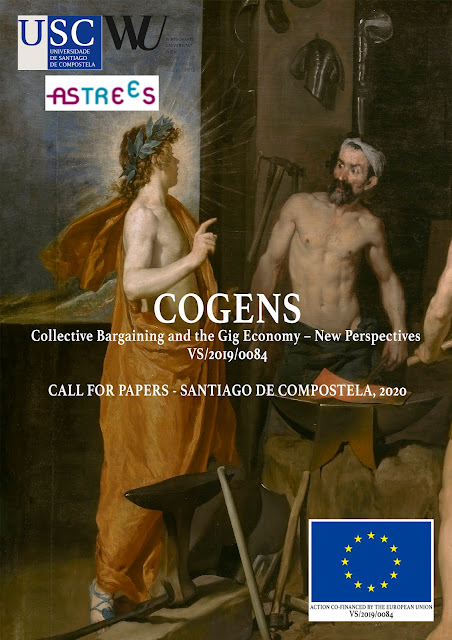Call for papers
CALL FOR PAPERS
COLLECTIVE BARGAINING AND THE GIG ECONOMY: NEW
PERSPECTIVES
Santiago de Compostela, 17th & 18th
September 2020
1.
The COGENS project
COGENS (www.cogens2019.eu) is a research project led by the Universidade de Santiago de Compostela,
the Wirtschaftsuniversität Wien and Astrées, with a team that includes 17
countries. It is co-financed by the European Union (VS/2019/0084)
The COGENS project is
integrated by the following researchers: Belgium, Auriane Lamine; Czech
Republic, Jakub Tomšej; Germany, Judith Brockmann; Spain, José María Miranda
Boto, Yolanda Maneiro Vázquez, Diana Santiago Iglesias, Guillermo Barrios
Baudor and Daniel Pérez del Prado; France, Sylvaine Laulom, Marie-Cécile
Escande-Varniol, Cécile Nicod and Christophe Teissier; Italy, Piera Loi;
Hungary, Tamás Gyulavári and Gábor Kártyás; Luxembourg, Luca Ratti;
Netherlands, Nicola Gundt; Austria, Franz Marhold and Elisabeth Brameshuber;
Poland, Łukasz Pisarczyk; Portugal, Teresa Alexandra Coelho Moreira; Romania,
Felicia Rosioru; Slovenia, Barbara Kresal; Sweden, Jenny Julén Votinius; United
Kingdom, Jeremias Prassl; and Turkey, Kubra Dogan Yenisey.
José María Miranda Boto, from
the Universidade de Santiago de Compostela, and Elisabeth Brameshuber, from the
Wirtschaftsuniversität Wien, are in charge of the academic coordination of the
team. Christophe Teissier, from Astrées, helps them in this task.
This project follows the path
of previous research by the INLACRIS network. The traditional structures of
collective bargaining have been decisively affected by the crisis, as well as
important features of the labour market. The current scenario can be described
as a never-before perceived evasion of labour law, where traditional structures
are eroding.
The challenges labour law is
facing right now due to the gig economy, digitalization and the erosion of the
employment contract promise to be severe and long-lasting. The main proposal of
this project is a deeper look into collective bargaining as possible instrument
to tackle the problems arising from the changes in the standard employment
relationship.
Collective agreements, though,
could quite easily provide a means for including persons working in the gig economy-context
and thus granting minimum protection, as reflected by the ILO-report on
non-standard employment.
Contrary to recent
developments and the decline in collective bargaining, the challenges of the
gig economy-labour market could therefore lead to a renaissance of collective
bargaining as a central regulatory instrument in labour law.
Within this framework, the
present call for papers is issued to add new points of view to the final Conference
of COGENS, that will take place in Santiago de Compostela, Spain, on the 17th
and 18th September 2020. The selected papers will be published in a
special issue of the Hungarian Labour Law E-Journal (http://hllj.hu/).
2. Subject and formalities
As the COGENS
project deals with collective bargaining and the gig-economy, three different
tracks are offered:
a. Collective
bargaining in the gig economy – who and for whom
b. Collective
bargaining in the gig economy – content
c. Collective
bargaining in the gig economy – implications for EU law
Scholars and
practitioners interested in presenting papers at the conference are invited to
submit a proposal according to this template before the 1st December
2019, via e-mail to taniafernandez.saborido@usc.es :
Name
Affiliation
Title
Track
Scientific
proposal (max 3.000 characters including spaces and footnotes)
By proposing a
paper, the applicants agree to submit the full paper by Monday, 31st
August 2020, the latest, according to the publication rules of the HLLJ: http://hllj.hu/letolt/szerksza.pdf. The
submission of the paper is compulsory in order to participate and present the
paper in the Conference.
Proposals will
be subject to blind peer-review by the Scientific Committee and the selection
will be announced before the 1st March 2020.
A maximum of
three proposals will be selected in each track, and they will be presented in
special sessions in the final conference in Santiago de Compostela. The authors
of the papers selected will pay a reduced inscription fee in the Conference of 50
euros.
The Scientific
Committee will choose the best paper presented, and the winner of the INLACRIS
Prize will be announced during the gala dinner of the Conference.
3. Scientific Committee
The Scientific
Committee is chaired by Tamás Gyulavári, as Editor of the HLLJ, and is composed
by Guillermo L. Barrios Baudor, Nicola Gundt, Sylvaine Laulom, Piera Loi, Teresa
Alexandra Coelho Moreira, Jeremias Prassl and Luca Ratti.

Comments
Post a Comment